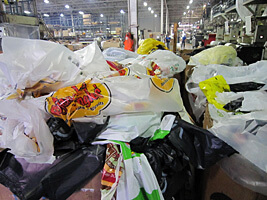
Plastic Bags are Easiest to Recycle
Recently an article published in Mother Earth Living came to my attention. Below is a letter of rebuttal from Pete Grande, President of Command Packaging, Inc. in response to an article which appeared in the Mother Earth News. I felt that the original article was biased and incorrect and appreciated Pete’s response. I have seen plastic bags being recycled for myself at Pete’s plant and know how easy it is to do and how little energy it takes. I could have litterally tossed plastic T-sacks into this re-grinder machine, pushed the start button and in only a minute have plastic resin pellets ready for the extruders. If I wanted to prove a point, probably within an hour I could have tossed in a used bag and seen a brand new one reborn.
Robby Meadows, Nashville Wraps
From Pete Grande
It is amazing how much media energy is being spent on plastic these days. While it is an important discussion, what I’ve found in my research has led me to realize that just because something is written doesn’t make it true. Now that you’ve been warned, what I have learned from my research will surprise you and I encourage you to do your own research as well. The EPA has a pretty good and unbiased database if you choose to investigate further. After studying the issue I have determined that plastic isn’t bad for the environment, and if people take the time to recycle it, it’s actually better in many ways than the alternatives. Seven things I learned about plastic are:
- All plastic is recyclable. The fact that consumers are not told to recycle or that the government-controlled waste collection system precludes collection of plastics does not mean that plastic can’t be recycled. It can.
- Plastic bags can be recycled in many municipalities across the country.
- There is significant demand for recycled plastics, particularly if the consumer is made aware of how to properly recycle plastic.
- “Downcycling” should not be an issue because it is not true in many cases. As an example, recycled plastic bags can and are recycled into new plastic bags. Much of the recycled paper is turned into newsprint which has never been raised as an issue to stop using paper.
- It is a myth that if plastic is eliminated it will create more available oil or gas for heating or fuel. Less than 3% of the feedstock, oil or natural gas, is used to make ALL plastics. That 3% is known as derivatives that become available during the refining process. If all plastics were banned, that would not create 3% more fuel; it would create 3% wasted material that would be burned at the refineries. Until recently, Middle Eastern refineries simply “flared off” these derivatives. Now they are capturing them and producing plastic raw materials. This is known as sustainable use of resources UNLESS we are going to stop refining natural gas and oil all together.
- Plastic is the MOST efficient material to use if landfills are the concern. Plastic takes up far less space than paper, metals, glass, or reusable bags when they are disposed of. At the present time, plastic film and bags take up far less space in the landfills than these other products and eliminating them would fill our landfills faster.
- Reusable bags are indeed the best solution to single use disposable bags; however the much-touted cloth and non-woven polypropylene (a non-recyclable plastic) bags are NOT better choices for the environment than polyethylene plastic reusable bags. In a complete analysis of ALL environmental factors, cloth and non-woven polypropylene bags require more energy and pollution in the growing and manufacturing process in addition to far greater transportation and pollution costs. The amount of uses in a non-woven or even cloth reusable bag is not significantly greater than a heavy weight polyethylene bag. Considering the cost difference of a heavy weight polyethylene bag (about $.50 each) versus cloth or polypropylene ($1 – $10 each) encouraging the use of reusable polyethylene bags would save far more energy and pollution not to mention financial burden on consumers. If these benefits aren’t enough consider that heavy weight polyethylene bags can be made with as much as 50% recycled plastics, are likely to be made in the United States (jobs), and can be recycled when the consumer is finished with them.
Today we want simple answers to complex problems and unfortunately, mis-information is rampant in our society. Reduce, reuse and recycle are still the best norms every consumer should make as their conscious practice, but getting the entire story so that doing the right thing should also be part of responsible behavior.
For more information on polyethylene reusable bags go to: Nashville Wraps Green Way TM Information
You may contact the authors of Mother Earth Living at 1503 SW 42nd St., Topeka, Kansas 66609. We did not seek permission to reprint their artical of Jan 22,2008 entitled “Plastic Quiz” because of their copyright. But check them out at: http://www.motherearthnews.com/
How to recycle plastic bags
- Collect recycled material from local businesses and from consumer sources.
- Sort recycled material from manufacturing waste.
- Recycling plastic minimizes waste and down-cycling.
- Produce pellets from recycled material.
- Mix recycled material (pellets) into extruder.
- Create new plastic film.
- Create new plastic bags made with recycled material collected and made in the U.S.A.
